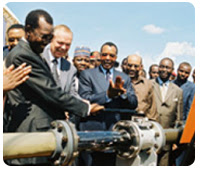


Equatorial Guinea might have disappeared from our geopolitical radar had Mobil not struck oil in the waters off Malabo in 1995. It quickly became clear that the Zafiro oil field was world-class. Oil production in Equatorial Guinea stands at more than 300,000 barrels a day, which at current prices translates to nearly $5.5 billion a year. A gas field owned by Marathon Oil has also become a major producer, and the ocean beds off Equatorial Guinea are being combed for additional deposits. Energy companies have invested several billion dollars in Equatorial Guinea, and Marathon has built a major liquefied natural gas facility. It is now possible to fly nonstop from Malabo to Texas on a weekly flight known as the “Houston Express.”
Equatorial Guinea is not the only country in the region to have emerged as a major oil supplier for the United States. West Africa is central to America’s effort to reduce dependency on Middle East oil. The region currently supplies 15 percent of America’s energy, and that figure is expected to rise to 25 percent within a few years
Equatorial Guinea's natural gas reserves are located offshore Bioko Island, primarily in the Alba and Zafiro oil and gas fields. Natural gas and condensate production in Equatorial Guinea expanded rapidly in the 5-year period following new investments by major stakeholders in the Alba natural gas field. Alba, the country's largest natural gas field, contains 1.3 trillion cubic feet (Tcf) of proven reserves, with probable reserves estimated at 4.4 Tcf or more.
Marathon Oil, other investors, and the state-owned gas company, SONOGAS, joined together in a $1.5 billion deal to construct a liquefied natural gas (LNG) facility on Bioko Island. The world-class facility shipped its first product in May 2007. In early 2008 Marathon and the government announced tentative plans to construct and operate LNG trains 2 and 3, pending confirmation of feedstock gas from national and neighboring gas fields.
The Okume Complex field is located offshore Equatorial Guinea, West Africa, and consists of the Elon, Okume, Oveng and Ebano reservoirs in water depths ranging from 27 to 500 meters. The development includes two separate mini-TLPs at the Okume/Ebano and Oveng reservoirs and three shallow water wellhead platforms at Elon. A single Central Processing Facility at Elon will handle crude from all four fields. Production from the field will be tied back to the existing Sendje Ceiba FPSO via a 12-inch oil export pipeline system.
Equatorial Guinea is now the third-largest producer of crude oil in Sub-Saharan Africa, after Nigeria and Angola. Equatorial Guinea's oil reserves are located mainly in the hydrocarbon-rich Gulf of Guinea. Large amounts of foreign investment primarily by U.S. companies have poured into the country's oil sector in recent years. Equatorial Guinea's total proven oil reserves are estimated at 1.1 billion barrels.
In October 2004, the government capped oil production at 350,000 barrels per day (bbl/d) to extend the life of the country's petroleum reserves, but lifted the cap the next year to allow expansion. With the addition of LNG production that came on line in 2007, total hydrocarbon production peaked in 2008. It is now in decline. Three fields--Zafiro, Ceiba, and Alba--currently account for the majority of the country's oil output.
In 2001, GEPetrol was established as Equatorial Guinea's national oil company. It was originally to be the primary state-run institution responsible for the country's downstream oil sector activities. However, since 2001 its primary focus has become managing the government's stakes in various Production Sharing Contracts (PSCs) with foreign oil companies. GEPetrol also partners with foreign firms to undertake exploration projects and has a say in the country's environmental policy implementation. In its recent block-licensing negotiations, Equatorial Guinea has pursued increases in the government's stake in new PSCs. In early 2008 it announced a $2.2 billion purchase of U.S.-based Devon Energy's stake in the country's oil fields, increasing its participation to 20% in the Zafiro field operation.
The Zafiro field is Equatorial Guinea's largest oil producer, with output rising from an initial level of 7,000 bbl/d in August 1996 to approximately 280,000 bbl/d by 2004. Ceiba, Equatorial Guinea's second major producing oil field, is located just offshore of Rio Muni and is estimated to contain 300 million barrels of oil. Production at Ceiba rose dramatically during the 2-3 year period following improvements and upgrades to the facility. Alba, Equatorial Guinea's third significant field was discovered in 1991. Original estimates of reserves at Alba were around 68 million barrels of oil equivalent (BOE), but recent exploration has increased estimates significantly to almost 1 billion BOE. Unlike the Zafiro or Ceiba fields, exploration and production at Alba has focused on natural gas, including condensates.
Ceiba's discovery has significantly increased interest in petroleum exploration of surrounding areas, with many new companies acquiring licenses in exploration blocks further offshore in the Rio Muni basin. International companies with interests in one or more exploration blocks include Chevron (U.S.), Vanco Energy (U.S.), Atlas Petroleum International (U.S.), Roc Oil (Australia), Petronas (Malaysia), Sasol Petroleum (South Africa), and Glencore (Switzerland). In October 2004, Noble Energy Equatorial Guinea, an Equatoguinean subsidiary of American Noble Energy, Inc. signed a contract to exploit a new oil field off the island of Bioko. Recently, Equatorial Guinea gave the Chinese National Offshore Oil Company (CNOOC) the rights to its newest oil field but Chinese exploration has to date been unsuccessful.







